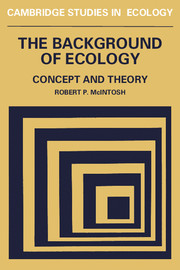Book contents
- Frontmatter
- Contents
- Preface
- Acknowledgments
- 1 Antecedents of ecology
- 2 The crystallization of ecology
- 3 Dynamic ecology
- 4 Quantitative community ecology
- 5 Population ecology
- 6 Ecosystem ecology, systems ecology, and big biology
- 7 Theoretical approaches to ecology
- 8 Ecology and environment
- References
- Name index
- Subject index
5 - Population ecology
Published online by Cambridge University Press: 05 August 2012
- Frontmatter
- Contents
- Preface
- Acknowledgments
- 1 Antecedents of ecology
- 2 The crystallization of ecology
- 3 Dynamic ecology
- 4 Quantitative community ecology
- 5 Population ecology
- 6 Ecosystem ecology, systems ecology, and big biology
- 7 Theoretical approaches to ecology
- 8 Ecology and environment
- References
- Name index
- Subject index
Summary
The early traditions of self-conscious ecology were marked by the tendency of ecologists to study either an individual species or aggregates of species. Proponents of the new biology of the 19th century concentrated on morphological and physiological properties of species, typically in the laboratory. As protoecologists returned to study of organisms in the field, they combined some of the interests and skills of physiologists and morphologists with the concerns of biogeographers and natural historians about distributions of and interrelations among species. One of the earliest terminological distinctions made in the emergence of “self-conscious” ecology was (in 1896) the addition of prefixes to create “autecology” and “synecology” (Chapman 1931). Aut-literally designates “self” or “individual,” but in ecological practice it described studies of a small group of individuals of a species, which was regarded as a unit. Ambiguity was avoided, temporarily, by Adams (1913), who distinguished three classes of ecology: “individual,” “aggregate,” specifying the taxonomic unit, and “associational,” citing Mobius's biocoenose as an example of the last. Adams's contemporary, Shelford (1929:608), had little use for autecology. To Shelford, at that date at least:
Ecology is a science of communities. A study of the relations of a single species to the environment conceived without reference to communities and, in the end, unrelated to the natural phenomena of its habitat and community associates is not properly included in the field of ecology.
- Type
- Chapter
- Information
- The Background of EcologyConcept and Theory, pp. 146 - 192Publisher: Cambridge University PressPrint publication year: 1985



